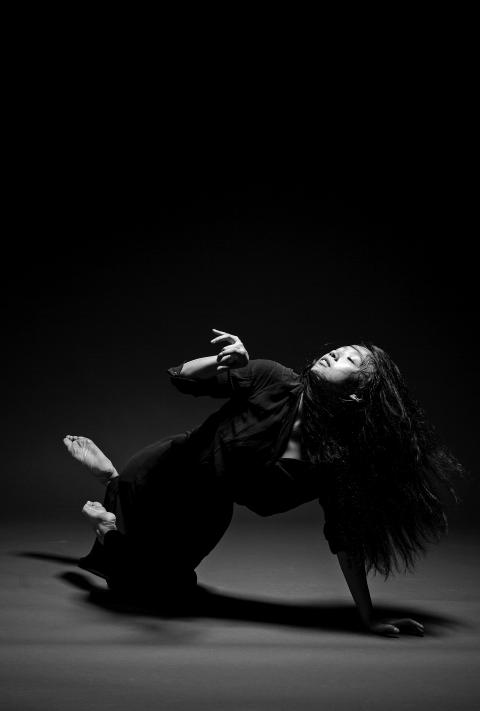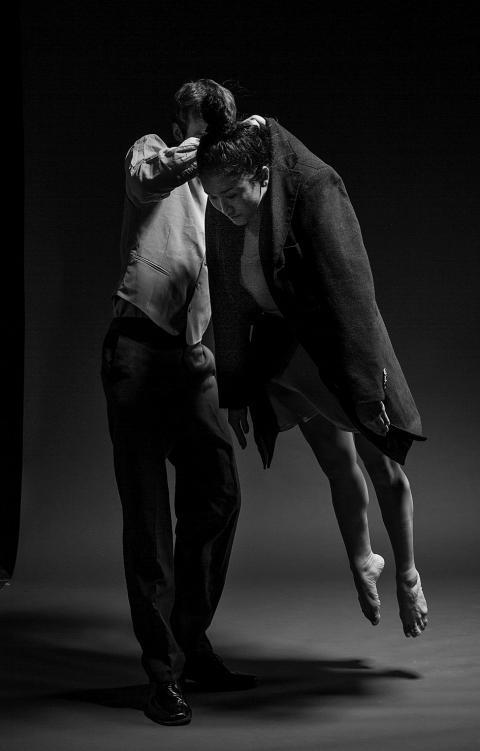This was a year of standout performances by young male choreographers, two females and some older hands, showing there is a lot of up and coming Taiwanese artists and experienced ones to reinvent themselves.
It was also a year that proved that the most surprising and memorable shows could appear when you least expect it.
‘GARDENIA’ AND ‘MAATAW’

Photo: Courtesy of Terry Lin
The year got off to a blooming start with Wu Chien-wei’s (吳建緯) Gardenia (六出) at Taipei’s Wellspring Theater for his Tussock Dance Theater (野草舞蹈聚落). Wu created a smart, intriguing duet with Cheng Hao (鄭皓) that got an extra kick from costumes by London-based Taiwanese fashion designer Johan Ku (古又文).
The Formosa Indigenous Dance Foundation of Culture and Arts (原住民族樂舞劇) took a swing at vested interests in its January production of Maataw: the Floating Island (浮島) at the National Theater, a powerful indictment of the government’s exploitation of the Tao of Orchid Island (Lanyu, 蘭嶼) that also highlighted the callous disregard and disrespect shown by the ever-growing number of tourists toward the the island’s residents.
The company was able to tour Maataw to Aboriginal communities nationwide over several months, but given the Council of Indigenous Peoples’ reported dislike of the strongly political work, one cannot help buy wonder if the council will as generous toward future works by the troupe.

Photo: Courtesy of Terry Lin
TONGUES ARE WAGGING
Cloud Gate 2’s (雲門2) artistic director Cheng Tsung-lung’s (鄭宗龍) 13 Tongues (十三聲) in March at the National Theater found him pushing through his usual comfort zone in terms of a longer length (70 minutes) and a move away from abstract works to a more personal one, based on memories of his childhood in Taipei’s Wanhua District (萬華).
Audiences might have been worried about their comfort level heading into the Cloud Gate Theater for Liu Kuan-hsiang’s (劉冠詳) Kids(我知道的太多了) in May, which was about his terminally ill mother’s final months and his interactions with her.
However, the piece, produced by the Horse troupe (驫舞劇場) and featuring Liu’s wife, Chien Ching-ying (簡晶瀅), as well as Lin Yu-ju (林祐如), turned out to be a powerfully touching work that was ultimately uplifting.
It also helped put Liu on Cloud Gate Dance Theatre’s (雲門舞集) radar, and he has been tapped to create a piece for Cloud Gate 2’s Spring Riot next year.
It was great to see Europe-based Lee Chen-wei’s (李貞葳) Together Alone (孤單在一起), at the beginning of June. The duet with Hungarian dancer and actor Vakulya Zoltan for the National Theater Concert Hall’s “Innovation Series” reinforced the reputation Lee has created with her solos in recent years for Ho Hsiao-mei’s (何曉玫) Meimage Dance Company’s New Choreographer Project.
STANDOUT PERFORMANCE
The standout performance in this year’s New Choreographer Project was by Germany-based Tien Tsai-wei (田采薇), a member of Tanztheater Wuppertal Pina Bausch, a duet with German dancer Jan Moellmer titled, The Man.
I have long been a fan of Bulareyaung (Bula) Pagarlava’s work, whether for Cloud Gate, Cloud Gate 2 or other troupes, but Colors (漂亮漂亮) for his Bulareyaung Dance Company (布拉瑞揚舞團) at the Cloud Gate Theater in October was a delight from start to finish.
Lighting/stage designer Li Chien-chang (李建常) and Bula were able to evoke the blues of Taitung’s sky and seashore and the sounds of the ocean with creative lighting and several large blue and white striped plastic tarps, while Bula’s choreography brought out the best in his dancers.
The Taipei National University of the Arts’ Dance Department’s annual Winter Dance Concert showed why its students, alumni and faculty continue to dominate Taiwan’s dance world.
‘ALTERNATE REALM’
While department chairman Zhang Xiaoxiong (張曉雄) has created a long list of solid works, and his Guang Ling Verse (廣陵散) was a gorgeous, complicated piece for 10 male dancers set to guqin (古琴) music that was mesmerizing to watch, it was young (26) choreography student Chang Kuo-wei’s (張國韋) Alternate Realm (鏡界) that proved to be the highlight of the show.
Chang blended hip-hop moves with contemporary technique and choreographed the movements of six large mirrors to create a multi-layered piece that was visually captivating and artistically challenging for its all-male cast.
This year was also memorable – on a sadder note – for the retirement from the repertoire of two beloved Lin Hwai-min (林懷民) works for Cloud Gate, 1994’s Songs of the Wanderers (流浪者之歌), and the classic Moon Water (水月) from 1988.
While Lin and company members insist the retirement is not permanent, any talk of returning the two to the line-up appears to be several years away.

William Liu (劉家君) moved to Kaohsiung from Nantou to live with his boyfriend Reg Hong (洪嘉佑). “In Nantou, people do not support gay rights at all and never even talk about it. Living here made me optimistic and made me realize how much I can express myself,” Liu tells the Taipei Times. Hong and his friend Cony Hsieh (謝昀希) are both active in several LGBT groups and organizations in Kaohsiung. They were among the people behind the city’s 16th Pride event in November last year, which gathered over 35,000 people. Along with others, they clearly see Kaohsiung as the nexus of LGBT rights.

Jan. 26 to Feb. 1 Nearly 90 years after it was last recorded, the Basay language was taught in a classroom for the first time in September last year. Over the following three months, students learned its sounds along with the customs and folktales of the Ketagalan people, who once spoke it across northern Taiwan. Although each Ketagalan settlement had its own language, Basay functioned as a common trade language. By the late 19th century, it had largely fallen out of daily use as speakers shifted to Hoklo (commonly known as Taiwanese), surviving only in fragments remembered by the elderly. In

Dissident artist Ai Weiwei’s (艾未未) famous return to the People’s Republic of China (PRC) has been overshadowed by the astonishing news of the latest arrests of senior military figures for “corruption,” but it is an interesting piece of news in its own right, though more for what Ai does not understand than for what he does. Ai simply lacks the reflective understanding that the loneliness and isolation he imagines are “European” are simply the joys of life as an expat. That goes both ways: “I love Taiwan!” say many still wet-behind-the-ears expats here, not realizing what they love is being an

In the American west, “it is said, water flows upwards towards money,” wrote Marc Reisner in one of the most compelling books on public policy ever written, Cadillac Desert. As Americans failed to overcome the West’s water scarcity with hard work and private capital, the Federal government came to the rescue. As Reisner describes: “the American West quietly became the first and most durable example of the modern welfare state.” In Taiwan, the money toward which water flows upwards is the high tech industry, particularly the chip powerhouse Taiwan Semiconductor Manufacturing Co (TSMC, 台積電). Typically articles on TSMC’s water demand